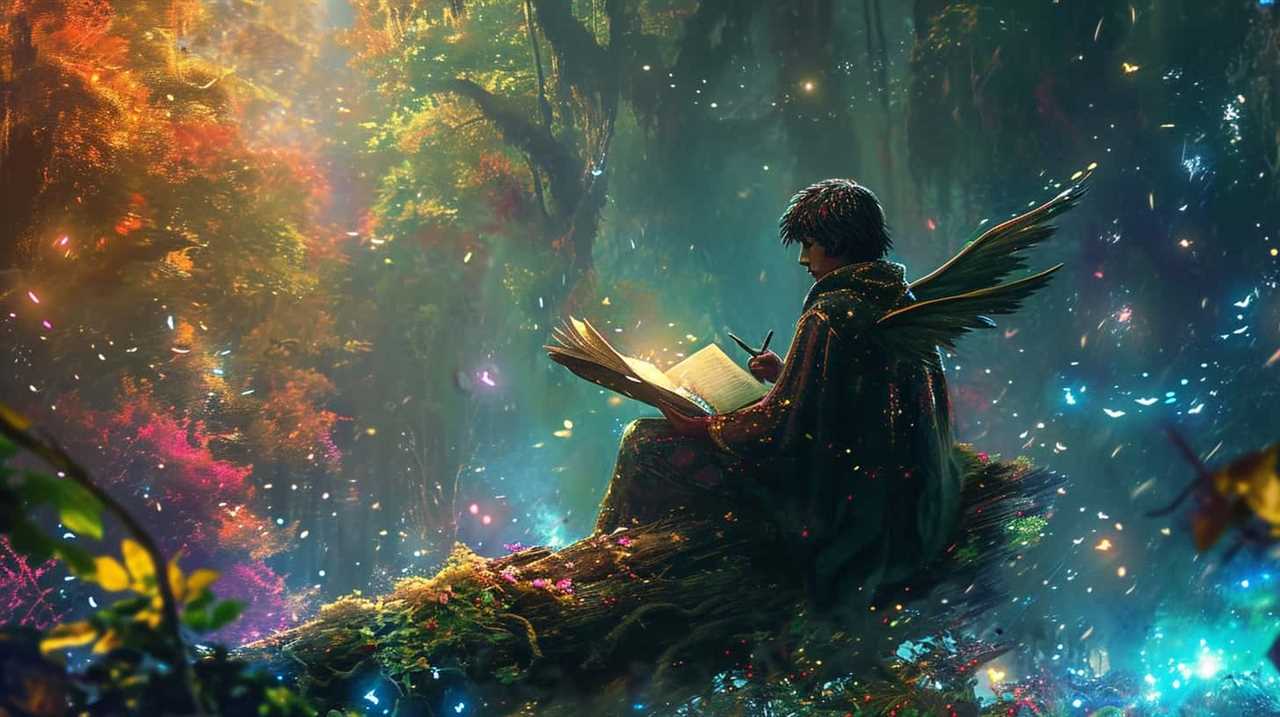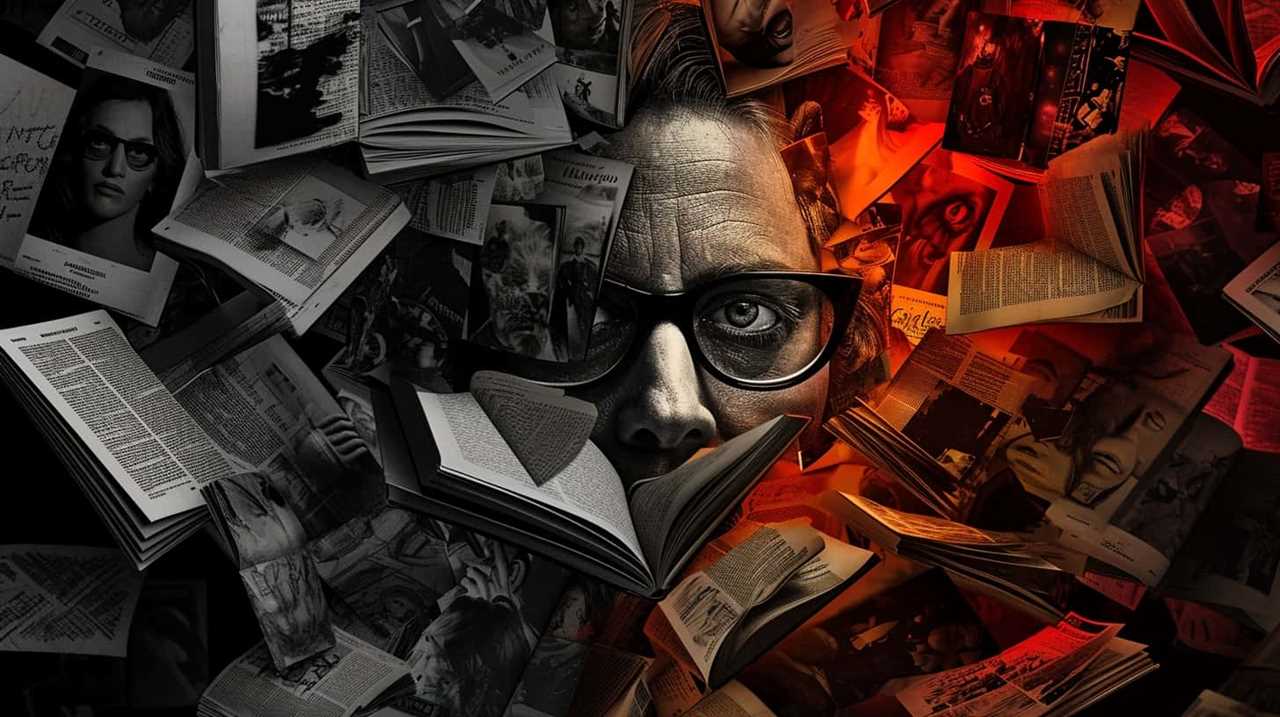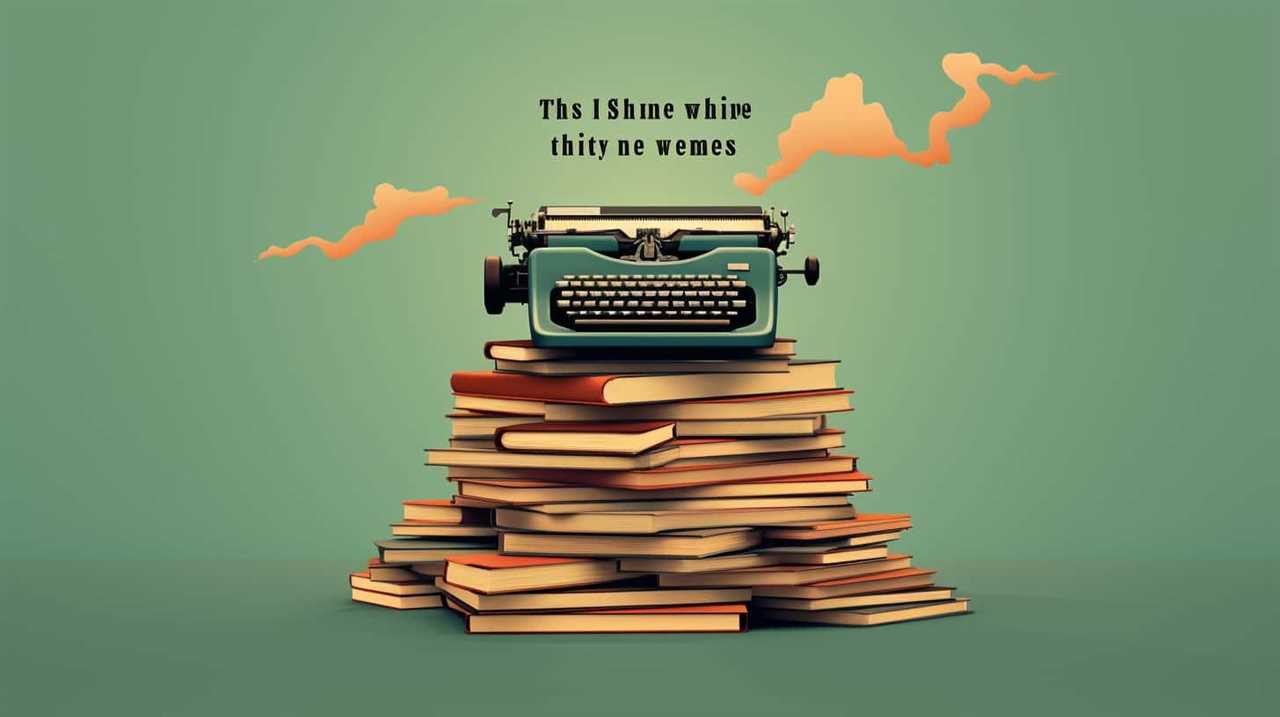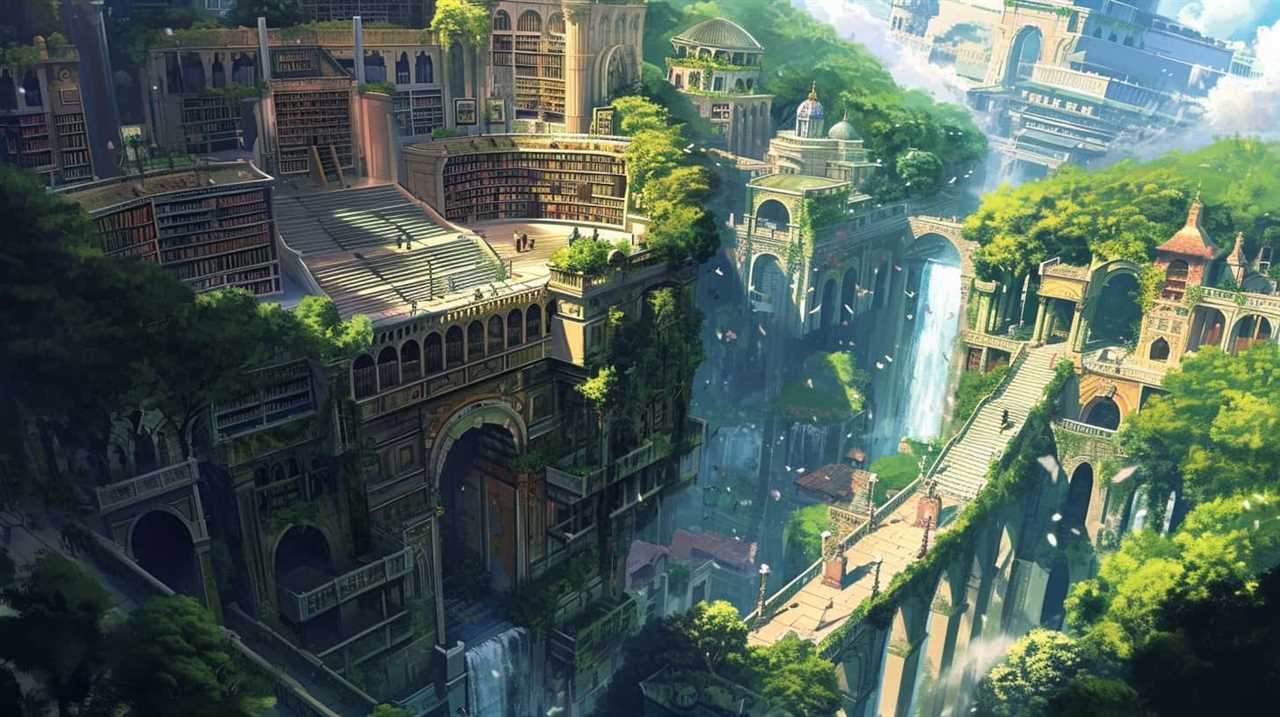Authors Quotations
Insights From Iconic Masters of Imaginative Fiction

Are you exhausted from hearing the same mundane stories over and over again? Wanting something new and full of creativity? You’re in luck!
In ‘Insights From Iconic Masters of Imaginative Fiction,’ we delve into the minds of legendary authors who have revolutionized the world of storytelling. Join us as we uncover the secrets behind J.R.R. Tolkien’s unparalleled world-building, C.S. Lewis’ profound understanding of the power of imagination, and Ursula K. Le Guin’s groundbreaking exploration of gender and identity in fantasy.
Gain valuable wisdom from Terry Pratchett’s clever wit, Neil Gaiman’s masterful blending of reality and fantasy, and J.K. Rowling’s extraordinary journey from page to screen. Discover the art of crafting unforgettable heroes and villains with David Eddings, learn the rules of building captivating magic systems from Brandon Sanderson, and immerse yourself in the beauty of language with Patricia McKillip.
Get ready to ignite your imagination and unlock a world of innovation!
Key Takeaways
- Creating intricate and believable fictional realms is essential in imaginative fiction.
- Challenging traditional narratives and exploring non-binary and fluid gender identities in fantasy can lead to a more inclusive understanding of gender and identity.
- Satire, humor, and social commentary can be powerful tools for exploring morality and ethics in fiction.
- Epic storytelling with attention to detail, including world-building and character development, can create rich and immersive reading experiences.
J.R.R. Tolkien’s Perspective on World-Building
When examining J.R.R. Tolkien’s perspective on world-building, we can see that he believed in the importance of creating intricate and believable fictional realms. Tolkien’s world-building techniques were meticulous and immersive, allowing readers to fully immerse themselves in the fantastical world of Middle-earth. One of the ways Tolkien achieved this was by exploring the history of Middle-earth in great detail.
Tolkien understood that a rich and well-developed history is crucial to creating a believable world. He meticulously crafted the history of Middle-earth, from its creation to the events that shaped its present. By delving into the past, Tolkien created a sense of depth and authenticity that captivated readers and made Middle-earth feel like a living, breathing place.
Tolkien’s exploration of Middle-earth’s history also allowed him to incorporate various cultures, languages, and mythologies into his world. He drew inspiration from real-world cultures and ancient myths, weaving them seamlessly into the fabric of Middle-earth. This attention to detail and cultural richness further enhanced the believability of his fictional world.
In conclusion, Tolkien’s world-building techniques, particularly his exploration of Middle-earth’s history, played a significant role in creating the intricate and believable fictional realms that have captivated readers for generations.
Now, let’s delve into C.S. Lewis’s perspective on the power of imagination.
C.S. Lewis on the Power of Imagination
C.S. Lewis illuminates the transformative potential of imagination through his insightful perspective on its power. In his works, Lewis explores the role of imagination in children’s literature and the impact it has on personal growth. Here are a few key insights to help you appreciate the significance of imagination in Lewis’s writings:
- Imagination as a Gateway to Other Worlds:
- Lewis believed that imagination allows us to transcend the limitations of our own reality and enter into new worlds of possibility.
- Through his iconic series, ‘The Chronicles of Narnia,’ Lewis invites readers to journey into a fantastical realm where imagination reigns supreme.
- Imagination as a Source of Moral Education:
- Lewis recognized the potential of imagination in shaping one’s moral compass.
- In his stories, he uses allegory and symbolism to teach valuable lessons about courage, sacrifice, and the battle between good and evil.
Ursula K. Le Guin’s Insights on Gender and Identity in Fantasy
Le Guin’s groundbreaking insights on gender and identity in fantasy challenge traditional narratives and encourage a more inclusive understanding of these themes. She recognized the power of speculative fiction to explore and redefine gender representation and identity exploration in ways that were not constrained by societal norms. Le Guin’s work often featured complex and diverse characters who defied gender stereotypes, allowing readers to question and reimagine the limitations placed on individuals based on their gender.
One of Le Guin’s notable contributions to the genre was her exploration of non-binary and fluid gender identities. In her novel "The Left Hand of Darkness," she introduced readers to the androgynous inhabitants of the planet Gethen, who have no fixed gender until they enter a state of sexual receptivity. By presenting a society where gender is fluid and not tied to biological characteristics, Le Guin challenged readers to reconsider their own preconceived notions about gender.
| Gender Representation | Identity Exploration |
|---|---|
| Non-binary characters | Challenging stereotypes |
| Fluid gender identities | Reimagining societal norms |
| Androgynous societies | Questioning preconceived notions |
Le Guin’s innovative approach to gender and identity in fantasy has had a profound impact on the genre. Her work continues to inspire authors to push the boundaries of traditional narratives and create more inclusive and diverse worlds. By challenging societal norms and encouraging readers to question their own assumptions, Le Guin’s insights have opened up new possibilities for exploring and understanding gender and identity in imaginative fiction.
Terry Pratchett’s Wit and Wisdom in Discworld
Pratchett’s satirical storytelling in Discworld has captivated readers with its clever and sharp wit. His ability to poke fun at various aspects of society, from politics to religion, showcases his keen observation and commentary on the human condition.
Additionally, Pratchett’s humor in Discworld isn’t just for entertainment, but also serves as a vehicle for exploring thought-provoking themes of morality and ethics.
Pratchett’s Satirical Storytelling
In our exploration of Terry Pratchett’s wit and wisdom in Discworld, we delve into the realm of satirical storytelling. Pratchett’s satirical genius is evident in his ability to use humor to critique and comment on various aspects of society. Through his stories, he skillfully satirizes politics, religion, and human nature, exposing their flaws and absurdities. Pratchett’s use of satire not only entertains readers but also challenges them to think critically about the world around them.
To fully appreciate Pratchett’s satirical storytelling, it’s important to understand the power of humor in storytelling. Humor has the ability to disarm readers, allowing them to engage with difficult or controversial subjects in a more lighthearted manner. Pratchett masterfully uses humor to present his social commentary, making his stories accessible and enjoyable while still conveying important messages.
As we transition into the subsequent section about humor in Discworld, we’ll explore the various comedic elements that Pratchett employs to bring his fantastical world to life.
Humor in Discworld
To fully appreciate the humor in Discworld and delve into Terry Pratchett’s wit and wisdom, we must explore the various comedic elements he skillfully employs to bring his fantastical world to life.
Pratchett’s comedic genius lies in his ability to use satire as a powerful tool for social commentary and critique. In Discworld, he satirizes various aspects of our own world, including politics, religion, and bureaucracy, using humor to expose their absurdities and flaws.

Through his sharp wit and clever wordplay, Pratchett invites readers to laugh at these familiar aspects of society, while also encouraging them to question and reflect upon their own beliefs and values.
By infusing his narratives with humor, Pratchett creates a unique blend of entertainment and intellectual stimulation, making Discworld not just a source of laughter, but also a platform for meaningful exploration of the human condition.
As we delve deeper into Discworld, we’ll discover how Pratchett’s humor intertwines with the themes of morality explored in his works.
Themes of Morality Explored
As we delve into Discworld, we explore the themes of morality that Terry Pratchett skillfully examines with his wit and wisdom. Pratchett’s novels aren’t only entertaining but also thought-provoking, as they delve into ethical dilemmas and the consequences of moral choices. Through his captivating storytelling, Pratchett invites readers to reflect on their own beliefs and consider the complexity of right and wrong.
To fully appreciate the exploration of morality in Discworld, consider the following:
- Nuanced Characters: Pratchett’s morally ambiguous characters challenge traditional notions of good and evil, forcing readers to question their own biases and preconceptions.
- Characters like Granny Weatherwax and Vimes embody the struggle between personal integrity and societal expectations.
- Pratchett skillfully depicts the internal struggle of these characters, making them relatable and human.
- Social Commentary: Pratchett uses satire and humor to critique societal norms and institutions, highlighting the ethical dilemmas they create.
- The Ankh-Morpork City Watch series examines the challenges of upholding justice in a corrupt society.
- Pratchett encourages readers to think critically about the consequences of their own moral choices and the impact they’ve on society.
Through his wit and wisdom, Terry Pratchett invites us to navigate the intricate web of morality, ultimately leaving us with a greater understanding of ourselves and the world around us.
Neil Gaiman’s Advice on Blending Reality and Fantasy
When it comes to blending reality and fantasy, Neil Gaiman offers valuable insights on how to strike a balance between the two. Gaiman emphasizes the importance of grounding fantastical elements in a sense of realism, allowing readers to connect with the story and characters on a deeper level.
Balancing Realism and Magic
One key insight we gain from Neil Gaiman is the importance of finding a delicate balance between realism and magic in the realm of imaginative fiction. Gaiman believes that while escapism is a powerful tool in storytelling, it’s equally important to ground our narratives in reality. This balance allows readers to connect with the story on a deeper level, while still experiencing the wonder and awe of magical elements.

In Gaiman’s view, the role of magic in storytelling isn’t just to provide a means of escape, but also to explore and reveal truths about the human condition. By blending realism and magic, writers can create narratives that are both innovative and relatable, captivating readers with their imaginative worlds while still offering insights into our own.
- Realism vs. Escapism:
- Gaiman emphasizes the importance of balancing the desire for escapism with the need for grounded, realistic elements in storytelling.
- He believes that a story should provide an escape from reality, but not at the expense of believability or emotional resonance.
- The Role of Magic in Storytelling:
- Gaiman sees magic as a tool for exploring and revealing truths about the human condition.
- He believes that magic shouldn’t just be used as a means of escape, but as a way to delve deeper into the complexities of our world and ourselves.
Crafting Believable Fantasy
We learn from Neil Gaiman that blending reality and fantasy is crucial in crafting believable fantasy narratives. To create immersive settings, authors employ various world-building techniques that merge the familiar with the extraordinary. Gaiman’s advice on this matter can be summarized in the following table:
| World Building Techniques | Examples |
|---|---|
| Incorporating real-world elements | Neil Gaiman’s "American Gods" draws upon various mythologies and cultures to create a contemporary fantasy world. |
| Connecting fantasy with human emotions | Gaiman’s "Stardust" presents a fantastical realm where love and longing drive the story. |
| Establishing consistent rules and systems | In "Neverwhere," Gaiman constructs a hidden London beneath the surface, governed by its own logic and hierarchy. |
George R.R. Martin’s Lessons on Character Development
From our study of George R.R. Martin’s works, we’ve gleaned invaluable insights into the art of character development. Martin’s lessons on character growth and storytelling techniques offer a wealth of knowledge for aspiring writers and fans of imaginative fiction alike. Here are two key takeaways:
- Complexity in Characterization: Martin excels at crafting multi-dimensional characters who evolve throughout his narratives. He understands that characters, like real people, possess a range of emotions, motivations, and flaws. By exploring the inner conflicts and contradictions within his characters, Martin creates a sense of authenticity that resonates with readers.
- Subverting Expectations: Martin’s storytelling techniques challenge traditional tropes and stereotypes. He subverts readers’ expectations by defying genre conventions and introducing unexpected plot twists. This approach keeps readers engaged and constantly guessing, as they never know what to anticipate next. Martin’s ability to surprise and shock his audience is a testament to his mastery of the craft.
Transitioning into Robert Jordan’s approach to epic storytelling, we’ll now delve into another celebrated author’s techniques for creating immersive and expansive worlds.
Robert Jordan’s Approach to Epic Storytelling
How does Robert Jordan approach epic storytelling?
Robert Jordan, the celebrated author of the epic fantasy series ‘The Wheel of Time,’ is known for his unique narrative structure and expansive world-building. Jordan’s approach to epic storytelling is characterized by his meticulous attention to detail and his ability to create a vast and intricate tapestry of interconnected storylines.
One of the key elements of Jordan’s narrative structure is his use of multiple points of view. Through the eyes of various characters, Jordan allows readers to experience the story from different perspectives, adding depth and complexity to the overarching plot. This technique also enables him to explore various subplots and develop a wide range of characters, each with their own unique motivations and story arcs.
Another aspect of Jordan’s approach is his commitment to world-building. In ‘The Wheel of Time,’ he creates a richly detailed and immersive world, complete with its own history, cultures, and magic system. This attention to detail not only enhances the believability of the setting but also adds depth and complexity to the story.
In conclusion, Robert Jordan’s approach to epic storytelling is characterized by his meticulous attention to detail, his use of multiple points of view, and his commitment to world-building. Through his narrative structure, Jordan creates a captivating and immersive reading experience for fans of epic fantasy.
Transition: Now that we’ve explored Robert Jordan’s approach to epic storytelling, let’s delve into Anne McCaffrey’s wisdom on dragons and science fiction.
Anne McCaffrey’s Wisdom on Dragons and Science Fiction
Anne McCaffrey imparts valuable insights on dragons and their role in the realm of science fiction. As one of the most prominent authors in the genre, McCaffrey’s contributions to literature have left a lasting impact on readers and fellow writers alike.
Here are some key takeaways from McCaffrey’s wisdom on dragons and her unique writing process:
- Dragons in Literature:
- McCaffrey revolutionized the portrayal of dragons in literature by humanizing them and giving them a deep emotional range. This allowed readers to form a connection with these mythical creatures and view them as more than just mindless beasts.
- Her dragons often served as metaphors for different aspects of humanity, exploring themes of power, freedom, and the struggle for identity. This added depth and complexity to her stories, elevating them beyond mere fantasy tales.
- McCaffrey’s Writing Process:
- McCaffrey was known for her meticulous research and attention to detail. She believed that a strong foundation in science and biology was crucial for crafting believable dragons and their ecosystems.
- She also emphasized the importance of character development, focusing on creating multidimensional protagonists and exploring their relationships with dragons. This allowed her to delve into complex themes while keeping the readers engaged.
Philip Pullman’s Thoughts on Religion and Fantasy
In the realm of religion and fantasy, Philip Pullman offers valuable insights into the interplay between these two elements in literature. Pullman, known for his acclaimed fantasy trilogy "His Dark Materials," explores the themes of religion and spirituality in a thought-provoking manner. His work delves into the complexities of organized religion, presenting a critique that challenges traditional beliefs and offers a fresh perspective.
Pullman’s critique of organized religion can be seen through his portrayal of the Church and its authority in his novels. He questions the control and power wielded by religious institutions, highlighting the potential dangers of blind faith and the suppression of individual thought. Pullman’s work invites readers to question established religious dogma and encourages them to explore their own spirituality in a more personal and introspective way.
| Religion and Spirituality | Pullman’s Critique of Organized Religion |
|---|---|
| Challenges traditional beliefs | Questions the control and power of religious institutions |
| Explores personal spirituality | Highlights the dangers of blind faith |
| Encourages introspection | Advocates for the freedom of individual thought |
Through his imaginative storytelling, Philip Pullman provides a platform for readers to engage with profound questions about religion and spirituality. His work invites us to critically examine the role of organized religion in society and encourages us to embrace a more open and individualistic approach to our spiritual journeys. Pullman’s insights offer a refreshing and innovative perspective on the interplay between religion and fantasy in literature.
Ray Bradbury’s Techniques for Creating Atmosphere
Ray Bradbury’s techniques for creating atmosphere in his imaginative fiction are notable for their sensory descriptions, symbolism, and impact of vivid imagery.

Through his masterful use of descriptive language, Bradbury engages the reader’s senses, allowing them to fully immerse themselves in the world he’s created.
Symbolism is another key element in Bradbury’s work, as he weaves rich layers of meaning into his stories, adding depth and complexity to the atmosphere.
Lastly, Bradbury’s vivid imagery leaves a lasting impression on the reader, evoking strong emotions and ensuring a memorable reading experience.
Bradbury’s Sensory Descriptions
From our perspective as writers and readers of imaginative fiction, one can’t underestimate the impact of Ray Bradbury’s techniques for creating atmosphere through his masterful use of sensory descriptions. Bradbury’s ability to immerse readers in a world of vivid sensations is unparalleled, making his works a true feast for the senses.
To fully appreciate Bradbury’s sensory immersion, it’s essential to understand his approach to descriptive prose. Here are two key aspects that contribute to the immersive experience:
- Evocative language: Bradbury carefully selects words that engage multiple senses, allowing readers to taste, smell, hear, see, and touch the world he creates. His meticulous attention to detail brings each scene to life, making it feel tangible and real.
- Synesthetic imagery: Bradbury often blends senses, creating synesthetic experiences that transcend conventional perception. By intertwining colors, sounds, and textures, he adds a layer of complexity to his descriptions, stimulating readers’ imaginations and challenging them to perceive the world in new and innovative ways.
Through these techniques, Bradbury’s sensory descriptions transport readers into rich and vibrant worlds, inviting them to fully immerse themselves in his imaginative fiction.
Symbolism and Atmosphere
Bradbury’s techniques for creating atmosphere through symbolism and imagery captivate readers and transport us into immersive worlds of imaginative fiction.
Symbolism and atmosphere play a crucial role in Bradbury’s works, allowing for exploration and interpretation of deeper meanings within his stories. By infusing his writing with vivid symbols and atmospheric descriptions, Bradbury creates a rich tapestry of emotions and themes that resonate with readers.

His use of symbolism, such as the mechanical hound in Fahrenheit 451 representing the oppressive nature of technology, adds layers of meaning to his narratives. Through his carefully crafted atmospheres, Bradbury invites readers to engage with his stories on a deeper level, encouraging them to decipher the hidden messages and draw their own conclusions.
The exploration and interpretation of symbolism and atmosphere in Bradbury’s works provide a truly transformative reading experience.
Impact of Vivid Imagery
With his masterful use of vivid imagery, Ray Bradbury transports us into immersive worlds of imaginative fiction, captivating readers and creating a powerful atmosphere that lingers long after the final page. Bradbury’s ability to paint a vivid picture with his words has profound psychological effects on the reader, allowing them to fully immerse themselves in the story. Through his detailed descriptions and sensory language, Bradbury engages our senses, making the reading experience come alive. The impact of his imagery is twofold: it not only enhances the reader’s understanding of the story, but it also elicits emotional responses, creating a deeper connection between the reader and the narrative. Bradbury’s techniques for creating atmosphere through vivid imagery result in an immersive reading experience that leaves a lasting impression.
- Bradbury’s use of descriptive language and vivid imagery brings the settings to life, allowing readers to visualize the worlds he creates.
- The detailed descriptions of characters and their surroundings make them feel real and relatable, enhancing the reader’s emotional investment in the story.
H.P. Lovecraft’s Influence on Horror in Fantasy
In our exploration of iconic masters of imaginative fiction, we delve into the profound influence H.P. Lovecraft has had on horror in the realm of fantasy. Lovecraft’s cosmic horror, characterized by the insignificance of humanity in the face of vast and malevolent cosmic forces, has left an indelible mark on the genre. His unique blend of psychological elements in his work has captivated readers and inspired countless authors in the field.
Lovecraft’s cosmic horror presents a departure from traditional horror tropes, focusing instead on the terror that arises from the unknown and the unknowable. His stories explore the concept of cosmic indifference, where humanity’s existence is inconsequential in the grand scheme of the universe. This cosmic horror creates a deep sense of dread and existential terror that’s unlike anything seen before in the genre.
Furthermore, Lovecraft’s incorporation of psychological elements adds another layer of complexity to his stories. His protagonists often grapple with their own sanity as they uncover the horrors lurking just beyond the veil of reality. Lovecraft expertly taps into the fears and anxieties of the human psyche, using psychological terror to enhance the sense of unease and dread experienced by his readers.
Lovecraft’s influence on horror in fantasy can’t be overstated. His cosmic horror and psychological elements have permeated the genre, inspiring countless authors to explore the depths of human fear and the unknown. Lovecraft’s legacy continues to shape the evolution of horror in fantasy, challenging authors to push the boundaries of imagination and innovation.
J.K. Rowling’s Journey From Page to Screen
From the moment we stepped onto the magical platform of Platform 9 ¾, we embarked on J.K. Rowling’s captivating journey from page to screen. Rowling’s writing process, combined with the behind-the-scenes magic of the Harry Potter films, has created a truly remarkable and innovative experience for fans worldwide.

To fully appreciate Rowling’s journey, here are some insights for you to enjoy:
- Intricate World-Building: Rowling’s meticulous attention to detail in her writing process allowed for the creation of a rich and immersive wizarding world. From the enchanting landscapes to the intricate rules of magic, every aspect was carefully crafted to engage the audience’s imagination.
- Magical Creatures: Rowling’s vivid descriptions of fantastical creatures, such as the majestic Hippogriffs and mischievous Nifflers, brought her world to life on the big screen. The behind-the-scenes work of the visual effects team further enhanced the magic, making these creatures appear both realistic and awe-inspiring.
- Complex Characters: Rowling’s characters are multi-dimensional and relatable, adding depth to her storytelling. The casting process for the films was meticulous, ensuring that each actor embodied the essence of their respective characters.
- Dumbledore’s Wisdom: The portrayal of Albus Dumbledore, brought to life by actors Richard Harris and later Michael Gambon, showcased the wisdom and guidance that the character provided throughout the series. The behind-the-scenes collaboration between the actors and the directors ensured that Dumbledore’s presence on screen captured the essence of the beloved character.
As we delve into David Eddings’ tips on crafting memorable heroes and villains, we explore the art of character development and its impact on the reader’s experience.
David Eddings’ Tips on Crafting Memorable Heroes and Villains
Crafting memorable heroes and villains requires careful consideration and skill. In order to create compelling protagonists, David Eddings suggests that writers develop characters with relatable qualities and flaws. According to Eddings, a well-crafted hero should possess a combination of strength and vulnerability, making them more relatable to readers. Additionally, he emphasizes the importance of giving heroes a clear motivation and goals to drive their actions throughout the story. By doing so, readers can invest in the journey and growth of the protagonist.
On the other hand, developing complex antagonists is equally crucial. Eddings believes that villains should not simply be one-dimensional evildoers, but rather individuals with their own motivations and backgrounds. By providing a glimpse into the antagonist’s perspective, Eddings argues that writers can create more nuanced and engaging conflicts in their stories.
To illustrate these concepts, let us examine a table comparing the characteristics of compelling protagonists and complex antagonists:
| Compelling Protagonists | Complex Antagonists |
|---|---|
| Relatable qualities and flaws | Motivated by their own goals |
| Clear motivation and goals | Nuanced and multi-dimensional |
| Demonstrates growth and transformation | Provides a unique perspective |
Brandon Sanderson’s Rules for Building Magic Systems
When it comes to building magic systems, Brandon Sanderson’s rules provide essential guidelines for authors to consider. These rules emphasize the need to strike a balance between establishing clear rules and allowing for creative possibilities.
Magic System Essentials
Our exploration of magic system essentials will delve into Brandon Sanderson’s rules for building these intricate systems.
Sanderson, a renowned fantasy author, is known for his meticulous approach to crafting unique abilities and balancing power levels within his magic systems. Here are two key aspects to consider when designing a magic system:

- Crafting unique abilities:
- Sanderson emphasizes the importance of giving each character a distinct set of magical abilities. This not only adds depth to the characters but also creates opportunities for creative problem-solving and strategic thinking.
- By carefully designing these abilities, authors can create a sense of wonder and intrigue, captivating readers with the endless possibilities of their world.
- Balancing power levels:
- Sanderson stresses the need for consistency and balance in magic systems. It’s crucial to establish clear limitations and rules to prevent characters from becoming too overpowered or underutilized.
- Striking the right balance ensures that conflicts remain engaging and challenges aren’t easily overcome, keeping readers invested in the story.
Balancing Rules and Creativity
How can we strike a balance between rules and creativity when building magic systems, according to Brandon Sanderson’s guidelines?
Finding the right balance between rules and creativity is essential in creating compelling and innovative magic systems. Sanderson emphasizes the importance of establishing clear rules and limitations to ensure consistency and avoid deus ex machina situations. By defining the boundaries of magic, authors can maintain the integrity of their storytelling and prevent the magic from becoming a convenient plot device.
However, Sanderson also acknowledges the need for maintaining artistic freedom. He encourages authors to explore unique and unexpected applications of magic while still adhering to the established rules. This approach allows for creativity and surprises within the magic system, while still providing a sense of structure and logic.
Striking this delicate balance enhances the overall world-building and adds depth to the narrative. Thus, the careful integration of rules and creativity in magic systems has a profound impact on storytelling.
Impact on Storytelling
To what extent does adhering to Brandon Sanderson’s guidelines for building magic systems impact the overall storytelling experience? When authors follow Sanderson’s rules, they create magic systems that not only enhance the plot but also delve into deeper themes of identity and exploration of cultural diversity.
Here are two ways in which adhering to Sanderson’s guidelines can enhance the storytelling experience:
- Consistency and logic: By establishing clear rules and limitations for magic, authors can create a sense of realism within their fantastical worlds. This consistency allows readers to better understand and engage with the magic system, enhancing their overall immersion in the story.
- Symbolism and metaphor: Magic systems can serve as powerful tools for exploring complex themes and cultural diversity. By incorporating different magical abilities and traditions, authors can metaphorically represent various aspects of identity and culture, providing readers with a rich and thought-provoking reading experience.
Transitioning into the next section, Patricia McKillip’s reflections on the beauty of language in fantasy further emphasizes the importance of crafting a captivating and immersive storytelling experience.
Patricia McKillip’s Reflections on the Beauty of Language in Fantasy
As we delve into Patricia McKillip’s reflections on the beauty of language in fantasy, it is evident that she illuminates the profound impact of words through her captivating storytelling. McKillip’s mastery lies in her ability to effortlessly weave together intricate worlds and characters with a poetic storytelling style that enchants readers.

In her works, McKillip demonstrates a deep appreciation for the beauty of language, using words as tools to create vivid imagery and evoke powerful emotions. Her prose dances across the page, painting breathtaking landscapes and breathing life into her characters. Through her words, she transports readers to fantastical realms where dreams and reality intertwine.
To further understand the impact of McKillip’s language, let us examine a table that showcases her skillful use of descriptive language:
| Passage from Patricia McKillip’s Work | Description |
|---|---|
| "The moon hung low, a silver coin dropped from some celestial pocket." | McKillip’s use of metaphor adds a touch of magic to the scene, creating a vivid image of the moon in the reader’s mind. |
| "The wind whispered secrets through the leaves, as if the trees themselves held the knowledge of the ages." | This passage showcases McKillip’s ability to personify nature, imbuing it with a sense of wisdom and mystery. |
| "Her voice, like a melody woven from starlight, filled the room and silenced all who listened." | The musical quality of McKillip’s language enhances the enchantment of the moment, captivating the reader’s imagination. |
| "The air crackled with magic, a tangible presence that sent shivers down their spines." | McKillip’s use of sensory language creates a palpable atmosphere, immersing the reader in the magical world she has crafted. |
Through her masterful use of language, Patricia McKillip elevates the genre of fantasy, captivating readers with her lyrical prose and transporting them to realms where words have the power to shape reality. Her reflections on the beauty of language serve as a reminder of the profound impact words can have on our imagination and our understanding of the world.
Frequently Asked Questions
How Did J.R.R. Tolkien’s Perspective on World-Building Influence His Writing Style?
Tolkien’s perspective on world-building greatly influenced his writing style, which in turn had a profound impact on modern fantasy literature. His intricate and immersive worlds captivated readers, inspiring countless authors to follow in his footsteps.
Can You Provide Examples of C.S. Lewis’ Use of Imagination to Convey Powerful Messages in His Works?
C.S. Lewis masterfully used imagination to convey powerful messages in his works. Through religious allegory and moral dilemmas, he captivated audiences with innovative storytelling that provoked deep reflection and stimulated intellectual growth.
How Did Ursula K. Le Guin Incorporate Themes of Gender and Identity Into Her Fantasy Novels?
Exploring the concept of gender fluidity, Ursula K. Le Guin incorporated themes of gender and identity into her fantasy novels by addressing societal norms. Her works challenge traditional gender roles, offering readers innovative perspectives on these complex topics.
What Are Some Notable Instances of Terry Pratchett’s Wit and Wisdom in His Discworld Series?
Terry Pratchett’s clever wordplay, satirical commentary, and philosophical insights in the Discworld series are notable. His wit shines through humorous characters and situations, offering readers a unique blend of entertainment and thought-provoking ideas.
How Does Neil Gaiman Effectively Blend Elements of Reality and Fantasy in His Storytelling?
Neil Gaiman effectively blends reality and fantasy in his storytelling through the skillful use of symbolism and the incorporation of mythology. This creates an innovative and imaginative narrative that captivates the audience.
How Can the Creative Insights from Renowned Painters be Applied to Imaginative Fiction Writing?
Studying artistic tips from painters can inspire imaginative fiction writers to think outside the box. Just as painters use color, texture, and composition to evoke emotions, writers can use vivid descriptions, unique perspectives, and unexpected plot twists to captivate readers. Embracing the creativity of renowned painters can elevate the craft of fiction writing.
Conclusion
In conclusion, the insights shared by these iconic masters of imaginative fiction offer a wealth of knowledge and inspiration for aspiring writers and avid readers alike.
From Tolkien’s meticulous world-building to McKillip’s appreciation for the beauty of language, each author brings their unique perspective and expertise to the table.
By blending reality with fantasy, exploring themes of identity and gender, and crafting memorable characters and magic systems, these writers have left an indelible mark on the genre, enriching our literary landscape with their wisdom and creativity.
Lauren’s talent in writing is matched by her passion for storytelling. Her love for books and deep understanding of culture and entertainment add a distinct flavor to her work. As our media and press contact, Lauren skillfully bridges the gap between afterQuotes and the broader media landscape, bringing our message to a wider audience.
Authors Quotations
Wisdom Whispers: Quotes From Legendary Literary Voices

At Wisdom Whispers, we strongly believe in the impact of words to motivate, enlighten, and expand the horizons of innovation.
Imagine immersing yourself in the wisdom of literary legends, hearing their voices echo through the ages. From Shakespeare’s timeless insights to Jane Austen’s sharp observations on love and society, our collection of quotes from legendary literary voices is a treasure trove of inspiration.
Mark Twain’s wit and satire will challenge your perspective, while Emily Dickinson’s reflections on life and nature will awaken your senses. Ernest Hemingway’s musings on courage and adventure will ignite your thirst for exploration, while Virginia Woolf’s thoughts on gender and identity will fuel your desire for change.
Join us on this journey of intellectual discovery, as we uncover the whispers of wisdom from the minds that shaped literature.
Key Takeaways
- Shakespeare’s works continue to have a significant influence on literature and language.
- Jane Austen’s writings provide unique insights into societal expectations and the pursuit of true love.
- Mark Twain’s wit and satire challenge societal norms and expose flaws and absurdities in society.
- Emily Dickinson’s poetry delves into human emotions and the mysteries of the natural world, provoking contemplation and introspection.
- Virginia Woolf’s writings explore the complexities of gender and identity, challenging societal norms and inspiring conversations about equality.
Shakespeare’s Timeless Wisdom
In our exploration of legendary literary voices, we delve into Shakespeare’s timeless wisdom. Shakespeare’s influence on literature and language can’t be overstated. His works continue to resonate with audiences across the globe, even after centuries have passed. Through his plays and sonnets, Shakespeare explored the complexities of the human condition, delving into universal themes that still hold relevance today.
One of the reasons why Shakespeare’s wisdom remains timeless is his ability to capture the essence of human emotions and experiences. His words have the power to evoke strong emotions and provoke deep introspection. Whether it’s the tragic tale of Romeo and Juliet or the political machinations of Macbeth, Shakespeare’s works offer profound insights into the human psyche.
Furthermore, Shakespeare’s influence extends beyond the realm of literature. His contributions to the English language can’t be ignored. Phrases such as ‘all’s well that ends well’ and ‘fair play’ have become part of our everyday lexicon. Shakespeare’s ability to craft memorable lines and phrases has left an indelible mark on the way we communicate.
Jane Austen’s Insights on Love and Society
Continuing our exploration of legendary literary voices, let’s now delve into Jane Austen’s profound insights on love and society. Austen’s works provide a unique perspective on the societal expectations and constraints faced by individuals in the Regency era. Through her keen observations and sharp wit, she offers a thought-provoking commentary on the complexities of love and the impact of societal norms on relationships. Here are five key insights from Jane Austen’s writings:
- Love as a product of social class: Austen highlights how societal hierarchies and wealth played a pivotal role in determining one’s prospects for love and marriage.
- The tension between societal expectations and personal desires: Austen explores the conflict between conforming to societal norms and following one’s heart, emphasizing the importance of authenticity and self-discovery.
- The power dynamics in relationships: Austen’s characters navigate power imbalances, revealing the complexities of love and the challenges faced by women in a patriarchal society.
- The role of reputation: Austen underscores the significance of reputation and its impact on an individual’s social standing and chances for love.
- The pursuit of true love and happiness: Austen celebrates the triumph of genuine love over superficiality and materialism, reminding us of the enduring power of authenticity in relationships.
Through her astute observations and incisive analysis, Jane Austen continues to captivate readers with her timeless insights into love and society, offering us a window into the complexities of human relationships in the Regency era.
Mark Twain’s Wit and Satire
Let’s now delve into the wit and satire of Mark Twain, a literary voice known for his sharp observations and humorous critique. Twain’s mastery of wit and satire in literature has made him one of the most celebrated writers of his time. Satire, as a literary device, allows authors to use humor and irony to highlight the flaws and absurdities of society. Twain, with his keen wit, used satire to expose the hypocrisy and follies of his era.
Mark Twain’s wit and satire had a profound impact on society. Through his writing, he challenged the status quo and forced readers to question the norms and values of their time. Twain’s satirical works, such as "The Adventures of Huckleberry Finn" and "The Adventures of Tom Sawyer," exposed the racism, greed, and corruption that plagued American society.
To better understand the impact of satire on society, let’s take a look at some of Mark Twain’s most memorable quotes:

| Quote | Book |
|---|---|
| "The secret of getting ahead is getting started." | Unknown |
| "The fear of death follows from the fear of life. A man who lives fully is prepared to die at any time." | Unknown |
| "The best way to cheer yourself up is to try to cheer somebody else up." | Unknown |
| "The only way to keep your health is to eat what you don’t want, drink what you don’t like, and do what you’d rather not." | Unknown |
| "The man who does not read good books has no advantage over the man who can’t read them." | Unknown |
These quotes showcase Twain’s wit and satirical commentary on various aspects of life. They encourage readers to question societal norms and reflect on their own actions and beliefs.
Transitioning into the subsequent section about Emily Dickinson’s reflections on life and nature, we can see that while Twain used satire to critique society, Dickinson used her poetry to explore the depths of human emotions and the mysteries of the natural world. Let’s now turn our attention to Dickinson’s unique perspective on life and nature.
Emily Dickinson’s Reflections on Life and Nature
Dickinson’s poetry offers profound insights into the human experience and the mysteries of life. Through her keen observations of nature, she captures its transformative power and reflects on the interconnectedness of all living things.
Her words evoke a sense of wonder and contemplation, inviting us to pause and reflect on the deeper truths that lie within ourselves and the natural world.
Dickinson’s Profound Insights
One of the most notable aspects of Emily Dickinson’s reflections on life and nature is the depth of insight she offers through her profound quotes. Her words resonate with a profound solitude, capturing the essence of the human experience in a way that’s both enigmatic and thought-provoking.
Through her poetry, Dickinson explores the complexities of existence, delving into themes of love, death, and the mysteries of the natural world. Her words have the power to ignite our imagination, challenging us to ponder the deeper meaning behind our own lives.
In her profound insights, Dickinson reminds us of the beauty and fragility of life, urging us to appreciate the small moments and find solace in the interconnectedness of all things. Through her enigmatic poetry, she invites us to embrace the unknown and seek wisdom in the simplest of observations.
- ‘Nature is a haunted house – but Art – a house that tries to be haunted.’
- ‘Forever is composed of nows.’
- ‘The soul should always stand ajar, ready to welcome the ecstatic experience.’
- ‘Tell all the truth but tell it slant.’
- ‘Hope is the thing with feathers that perches in the soul.’
Nature’s Transformative Power
Through our deep connection with the natural world, we’re transformed by its power to inspire and awaken our souls.
Nature has a healing power that can mend our broken spirits, providing solace and comfort in times of distress.
The beauty and serenity of the natural world can transport us to a place of inner peace and tranquility, offering a respite from the chaos and demands of daily life.
It’s through this spiritual connection with nature that we find renewal and rejuvenation.
As Emily Dickinson once said, ‘To make a prairie it takes a clover and one bee, One clover, and a bee, And revery.’ The simplicity and harmony of the natural world remind us of the interconnectedness of all living beings, and the transformative power of nature to bring us closer to our true selves.
As we explore Ernest Hemingway’s musings on courage and adventure, we discover how nature’s transformative power can inspire us to embrace new challenges and embark on daring journeys.
Ernest Hemingway’s Musings on Courage and Adventure
Hemingway’s poignant reflections on courage and adventure inspire us to embrace life’s challenges with unwavering determination. His works are a testament to the power of courageous storytelling, urging us to step out of our comfort zones and embark on daring journeys. Through his characters, Hemingway invites us to live life fully, to embrace the unknown, and to confront our fears head-on. Here are five key takeaways from Hemingway’s musings on courage and adventure:
- Embrace vulnerability: Hemingway teaches us that true courage lies in embracing vulnerability and facing our deepest fears. It’s through vulnerability that we find strength and growth.
- Live in the present: Hemingway’s characters live in the moment, fully immersed in their experiences. By embracing the present, we can extract the most out of life’s adventures.
- Seek authentic experiences: Hemingway encourages us to seek out authentic and meaningful experiences. It’s through these experiences that we find our true selves and discover what truly matters.
- Embrace solitude: Hemingway’s characters often find solace and courage in solitude. Taking time for introspection and self-reflection allows us to connect with our innermost desires and find the courage to pursue them.
- Embrace the unknown: Hemingway reminds us that life’s greatest adventures lie in the unknown. By embracing uncertainty and taking risks, we open ourselves up to a world of possibilities and personal growth.
Hemingway’s words inspire us to push the boundaries of what we believe is possible, to embrace the challenges that come our way, and to live life with unwavering determination. In doing so, we can create our own courageous stories and embark on truly transformative adventures.
Virginia Woolf’s Thoughts on Gender and Identity
Continuing our exploration of legendary literary voices, let’s now delve into Virginia Woolf’s profound insights on gender and identity. Woolf was a trailblazer in challenging traditional gender roles and societal expectations in her writing. She questioned the established norms of her time and highlighted the limitations that these gender roles imposed on individuals.

Woolf acknowledged the influence of societal expectations on one’s identity, particularly when it came to gender. She believed that these expectations stifled individuality and prevented people from fully expressing themselves. In her iconic work, ‘A Room of One’s Own,’ Woolf argued that women needed both physical and mental space to explore their creativity and develop their own identities outside of patriarchal constraints.
Through her writing, Woolf encouraged readers to question and challenge the rigid gender roles that society imposed. She believed in the importance of breaking free from these constraints and embracing one’s true self, regardless of societal expectations. In doing so, Woolf believed that individuals could discover their authentic identities and lead fulfilling lives.
Woolf’s thoughts on gender and identity continue to resonate today, as we navigate an ever-evolving understanding of gender and societal expectations. Her insights remind us of the importance of embracing our individuality and challenging the limitations that society places on us. Woolf’s legacy inspires us to question, explore, and redefine gender roles and identities in our own lives and in the world around us.
Frequently Asked Questions
How Did Shakespeare’s Plays Influence the English Language?
Shakespeare’s plays have had a profound influence on the English language. His linguistic impact is evident in the countless phrases and words he coined. His ability to capture the complexities of human emotion continues to shape modern English.
What Were the Main Themes Explored in Jane Austen’s Novels?
In Jane Austen’s novels, love and marriage, as well as social class and status, are prominent themes. Austen’s insightful exploration of these topics offers a thought-provoking commentary on society and human relationships.
How Did Mark Twain’s Humor and Satire Challenge Societal Norms of His Time?
Mark Twain’s impact on society was profound. Through his humor and satire, he fearlessly challenged societal norms, shedding light on their flaws and inspiring change. His words continue to provoke thought and encourage innovation.
What Inspired Emily Dickinson to Write About the Natural World?
Emily Dickinson’s poetic genius was inspired by the beauty and mysticism of the natural world. Her work explores the profound relationship between nature and spirituality, inviting readers to contemplate the vastness and wonder of existence.
How Did Ernest Hemingway’s Personal Experiences Shape His Writings on Courage and Adventure?
Hemingway’s courage and adventure were shaped by his war experiences. His personal reflection on the horrors of war and the resiliency of the human spirit infused his writings, inspiring readers to find strength in adversity.
Do Modern Authors’ Quotes on Writing Compare to Those from Legendary Literary Voices?
Many modern authors’ inspiring writing quotes hold their own against legendary literary voices. While the classics may have set the standard, contemporary writers offer fresh perspectives on the craft of writing, inspiring aspiring authors with their insight and wisdom. Both the old and new quotes serve to motivate and guide writers on their journey.
Conclusion
As we delve into the timeless wisdom of legendary literary voices, we’re reminded of the profound impact of their words on our lives. From Shakespeare’s timeless insights to Woolf’s thoughts on gender and identity, these authors continue to provoke thought and inspire introspection.
Their words serve as a guide, urging us to question, reflect, and seek a deeper understanding of ourselves and the world around us. In the whispers of their wisdom, we find the keys to unlocking our own potential and embarking on a journey of self-discovery.
Lauren’s talent in writing is matched by her passion for storytelling. Her love for books and deep understanding of culture and entertainment add a distinct flavor to her work. As our media and press contact, Lauren skillfully bridges the gap between afterQuotes and the broader media landscape, bringing our message to a wider audience.
Authors Quotations
Why Read Sci-Fi Authors’ Most Inspirational Quotes?

According to Albert Einstein, ‘Imagination is more crucial than knowledge.’
So why should we read sci-fi authors’ most inspirational quotes?
Well, fellow innovators, let us embark on a journey of exploration and limitless possibilities.
Sci-fi authors have the remarkable ability to transport us to new worlds, igniting our creativity and inspiring us to push the boundaries of what is possible.
Through their visionary tales, they provide us with a glimpse into the future, allowing us to embrace the unknown and embrace the power of change.
By immersing ourselves in their stories, we gain a deeper understanding of the complexities of our world and foster empathy for the diverse realities that exist.
So, join us as we dive into the realms of sci-fi and discover the boundless inspiration that lies within.
Key Takeaways
- Imagination shapes perspectives and drives innovation.
- Sci-fi quotes inspire individuals to think differently and question the status quo.
- Sci-fi authors have often been ahead of their time, predicting advancements in technology that were once thought to be mere fantasies.
- Embracing the unknown allows us to push the boundaries of what’s known, leading to new discoveries and advancements.
The Power of Imagination
In our daily lives, we often underestimate the profound impact that the power of imagination has on shaping our perspectives and driving innovation. Imagination isn’t just a whimsical tool for artists and dreamers; it holds the key to unlocking new possibilities and pushing the boundaries of what’s known.
As we venture into the uncharted territories of the future, the role of technology becomes paramount in aiding our exploration of the unknown. Technology acts as the catalyst for our imaginative endeavors, enabling us to bring our wildest ideas to life. It amplifies our imaginations, allowing us to devise solutions to complex problems and envision a future that was once unimaginable. The advancements in virtual reality, artificial intelligence, and space exploration have all been fueled by the power of imagination, coupled with the ingenuity of technological innovation.
Moreover, the power of imagination isn’t confined to the realm of fiction. It permeates every aspect of our lives, from the way we communicate to the way we conduct business. By embracing our innate ability to imagine and think creatively, we can drive innovation and create a future that’s both extraordinary and sustainable.
Exploring New Worlds
As we embark on our journey of exploring new worlds, we’ll encounter uncharted territories that challenge our understanding and push the boundaries of what’s possible. The vastness of space beckons us to embark on intergalactic adventures, to leave behind the familiarity of our own planet and set foot on unexplored terrain.
Here are four aspects of exploring new horizons that will captivate our imagination and drive us to push the limits of innovation:
- Unveiling alien civilizations: As we venture into the unknown, we’ll come across civilizations that are vastly different from our own. Their customs, languages, and technologies will open our minds to new possibilities and challenge our preconceived notions of what it means to be intelligent beings.
- Discovering breathtaking landscapes: Each new world we encounter will present us with awe-inspiring landscapes that defy our imagination. From vibrant and exotic flora to magnificent and otherworldly geological formations, these sights will leave us in a state of wonder and inspire us to protect the beauty of our own planet.
- Navigating treacherous terrains: Exploring new worlds will require us to overcome physical challenges and adapt to extreme environments. From treacherous mountains to toxic atmospheres, we’ll test the limits of our resilience and ingenuity.
- Unraveling cosmic mysteries: Our journey will lead us to encounter phenomena that defy our current understanding of the universe. From enigmatic black holes to unexplained cosmic phenomena, these mysteries will fuel our curiosity and drive us to unravel the secrets of the cosmos.
As we venture into the unknown, we won’t only explore new worlds but also push the boundaries of scientific knowledge and human potential. Our intergalactic adventures will inspire innovation and pave the way for a future where the unimaginable becomes reality.
Inspiring Creativity and Innovation
Our exploration of new worlds will undoubtedly be enhanced by the inspirational quotes of sci-fi authors, as they have the power to ignite our creativity and drive innovation. Sci-fi authors possess a unique ability to envision what the future holds, pushing the boundaries of what is possible and challenging our preconceived notions. Their words have the potential to inspire us to think differently, promoting innovative thinking and sparking new ideas.
To illustrate the impact of sci-fi quotes on creativity and innovation, let us consider the following table:
| Quotes from Sci-Fi Authors | Effects on Creativity and Innovation |
|---|---|
| "The future belongs to those who believe in the beauty of their dreams." – Eleanor Roosevelt | Ignites imagination and encourages individuals to dream big, fostering innovative ideas. |
| "Imagination is more important than knowledge." – Albert Einstein | Emphasizes the role of imagination in driving innovation, encouraging individuals to think beyond existing knowledge and limitations. |
| "The best way to predict the future is to create it." – Peter Drucker | Inspires individuals to take an active role in shaping the future, promoting a proactive and innovative mindset. |
| "The impossible is often the untried." – Jim Goodwin | Encourages individuals to challenge conventional thinking and try new approaches, fostering creative problem-solving. |
| "Innovation is seeing what everybody has seen and thinking what nobody has thought." – Albert Szent-Gyorgyi | Promotes unique perspectives and encourages individuals to think outside the box, driving innovative solutions. |
As we can see, sci-fi quotes have the power to ignite our imagination, challenge our thinking, and push the boundaries of what is possible. By incorporating these inspirational quotes into our lives, we can foster a culture of innovation and creativity, driving us towards a future filled with limitless possibilities.
A Glimpse Into the Future
As we explore the subtopic of ‘A Glimpse Into the Future’, we’re transported to a realm where sci-fi authors have the power to envision what lies ahead.
Their predictions, although imaginative, often hold a mirror to our own reality, offering insights into the potential impact of technological advancements and scientific discoveries.
Through their visionary words, sci-fi authors provide us with a window into a future that’s both exhilarating and cautionary, urging us to contemplate the consequences of our actions in shaping the world yet to come.
Future Predictions in Sci-Fi
In exploring the realm of ‘Future Predictions in Sci-Fi (A Glimpse Into the Future)’, we delve into the visionary landscapes imagined by sci-fi authors. These predictions offer us a glimpse into the possibilities of future technology and the ethical dilemmas that may arise.

Here are four intriguing predictions from the world of sci-fi:
- Artificial Intelligence (AI) surpasses human intelligence, leading to a new era of sentient machines.
- Virtual reality becomes indistinguishable from reality itself, blurring the boundaries of what’s real and virtual.
- Genetic engineering advances to the point where humans can enhance their physical and mental abilities, raising questions of inequality and human identity.
- The colonization of other planets becomes a reality, as humanity seeks to expand its reach beyond Earth.
These predictions, while speculative, force us to consider the potential impact on our future and the ethical challenges that may arise. As we explore these visionary landscapes, we’re left to ponder the implications and prepare for the impact on the real world.
Impact on Real World
The impact of the visionary landscapes imagined by sci-fi authors on the real world is profound.
Their ability to envision future technologies and societal implications has shaped our present and will continue to shape our future.
Sci-fi authors have often been ahead of their time, predicting advancements in technology that were once thought to be mere fantasies.
Their ideas have inspired scientists, engineers, and innovators to push the boundaries of what’s possible.
From Arthur C. Clarke’s concept of geostationary satellites to William Gibson’s portrayal of cyberspace, these authors have sparked our imaginations and paved the way for real-world innovations.
By exploring the possibilities of the unknown, they’ve challenged us to question the limits of our own potential.

As we delve into the impact of sci-fi on the real world, it becomes clear that embracing the unknown is essential for progress and innovation.
Embracing the Unknown
As we journey into the world of science fiction, we must confront our fear of the unknown. It’s natural to be apprehensive about what lies beyond our comfort zones, but it’s in this embrace of the unfamiliar that we can truly expand our boundaries.
Science fiction authors have long been pioneers in pushing the limits of human imagination, challenging us to question the status quo and explore uncharted territories. By embracing the unknown, we open ourselves up to endless possibilities and pave the way for a future that’s both exciting and transformative.
Fear of the Unknown
We must confront and embrace the unknown, as it’s through our fear that we find the greatest inspiration in the words of sci-fi authors. Fear of the unknown is a natural response, but it’s also a barrier that prevents us from exploring new possibilities and experiencing personal growth. When we overcome this fear and embrace uncertainty, we open ourselves up to a world of imagination and innovation.
Here are four reasons why embracing the unknown is essential:
- Expansion of knowledge: Embracing the unknown allows us to push the boundaries of what’s known, leading to new discoveries and advancements.
- Sparking creativity: The unknown stimulates our imagination, igniting the creative spark that drives innovation and problem-solving.
- Personal growth: Confronting our fears and embracing uncertainty helps us develop resilience, adaptability, and a growth mindset.
- Opening doors to new opportunities: By venturing into the unknown, we expose ourselves to new experiences, connections, and possibilities that can lead to transformative opportunities.
Embracing the unknown isn’t easy, but it’s through facing our fears that we unlock the potential for endless inspiration and growth.
Expanding Boundaries
Confronting and embracing the unknown expands our boundaries, allowing us to venture into uncharted territories and unlock new possibilities.
In the realm of science fiction, authors have long pushed the limits of our imagination, taking us on journeys beyond our wildest dreams. Their stories inspire us to explore the unknown, encouraging us to go beyond what we currently know and understand.

By expanding our horizons, we open ourselves up to a world of innovation and discovery. Embracing the unknown isn’t without its challenges, but it’s through these challenges that we grow and evolve.
As we push the limits of what’s possible, we pave the way for progress and transformation. So let’s embrace the unknown, for it’s in the uncharted territories that we’ll find the key to unlocking a future full of endless possibilities.
Challenging Conventional Thinking
In our quest to expand our perspectives and challenge the status quo, we must look beyond conventional thinking by delving into the profound words of sci-fi authors. These visionary writers have the ability to challenge assumptions and question norms, sparking our imaginations and pushing the boundaries of what’s considered possible.
Here are four ways in which sci-fi authors inspire us to challenge conventional thinking:
- Imagining alternate realities: Sci-fi authors transport us to worlds that defy our current understanding of the universe. By presenting alternative futures and realities, they encourage us to question the limitations of our own existence.
- Pushing technological boundaries: Through their futuristic visions, sci-fi authors inspire us to think beyond what’s currently achievable. They challenge us to explore new technologies and innovations that could revolutionize the way we live.
- Examining social constructs: Sci-fi authors often explore societal norms and question their validity. By challenging the accepted norms of our own society, they encourage us to critically analyze the systems and structures that shape our lives.
- Encouraging unconventional solutions: Sci-fi authors present us with complex problems and offer unconventional solutions. By thinking outside the box, they inspire us to seek innovative approaches and challenge the conventional wisdom.
Encouraging Critical Thinking
As we explore the subtopic of ‘Encouraging Critical Thinking’, we must acknowledge the profound impact that sci-fi authors’ inspirational quotes can have on enhancing our cognitive abilities and fostering independent thought.
These quotes not only challenge our existing beliefs and perspectives, but they also encourage us to question the status quo, think beyond the boundaries of what’s known, and imagine new possibilities.
Enhancing Cognitive Abilities
We have found that exploring the most inspirational quotes of sci-fi authors can significantly enhance our cognitive abilities, specifically by encouraging critical thinking. Here’s how:
- Improving problem solving: Sci-fi authors often present complex and futuristic scenarios that require us to think outside the box. By analyzing their quotes, we can develop our problem-solving skills and learn to approach challenges from different perspectives.
- Enhancing memory retention: Sci-fi quotes often contain profound concepts and imaginative ideas. Engaging with these quotes stimulates our brain, helping us to remember and retain information more effectively.
- Igniting creativity: Science fiction is known for pushing the boundaries of imagination. By immersing ourselves in the quotes of sci-fi authors, we can tap into our own creativity and explore innovative ideas.
- Embracing uncertainty: Sci-fi quotes often explore futuristic worlds and possibilities, encouraging us to question the status quo and embrace uncertainty. This mindset fosters adaptability and open-mindedness, essential qualities for navigating the ever-changing landscape of innovation.
Fostering Independent Thought
Reading the most inspirational quotes of sci-fi authors fosters independent thought and encourages critical thinking. It’s through the exploration of imaginative worlds and futuristic concepts that we’re able to expand our minds and challenge conventional thinking.
Sci-fi authors often present us with thought-provoking ideas that push the boundaries of what’s possible, forcing us to question the status quo and seek new solutions. By engaging with these ideas, we cultivate our own independent thinking and open ourselves up to personal growth.
As we delve into the works of visionaries like Isaac Asimov and Ursula K. Le Guin, we’re inspired to think critically about our own lives and the world around us, paving the way for innovation and progress.
Transitioning into the subsequent section about ‘lessons in resilience and perseverance’, we can see how these qualities further contribute to our personal and intellectual development.
Lessons in Resilience and Perseverance
One key lesson in resilience and perseverance that sci-fi authors teach us is the importance of embracing challenges head-on. In their stories of futuristic worlds and technological advancements, they show us that building resilience and overcoming obstacles isn’t only necessary, but also an opportunity for growth and progress.
Here are four insights from sci-fi authors that inspire us to face challenges with determination and perseverance:
- Adaptability: Sci-fi authors often present characters who must adapt to new environments, technologies, or even alien civilizations. They remind us that resilience requires the ability to embrace change and find innovative solutions to unforeseen circumstances.
- Willpower: Whether it’s battling against oppressive regimes or surviving in hostile environments, sci-fi protagonists display unwavering willpower. Their stories remind us that resilience isn’t just about physical strength, but also the mental fortitude to push through hardships and stay focused on our goals.
- Collaboration: Many sci-fi narratives emphasize the power of teamwork and collaboration. They teach us that resilience isn’t a solitary endeavor, but can be achieved by working together and leveraging diverse skills and perspectives.
- Imagination: Sci-fi authors encourage us to think beyond the boundaries of our current reality. Their stories remind us that resilience requires us to imagine new possibilities, challenge existing norms, and push the limits of innovation.
Discovering New Perspectives
As we explore the subtopic of ‘Discovering New Perspectives’, we embark on a journey of broadening our worldview through the lens of science fiction.
Sci-fi authors have the remarkable ability to unveil alternate reality perspectives, immersing us in worlds that challenge our existing notions of what’s possible.
Through their imaginative narratives, we’re transported to futuristic landscapes, allowing us to analyze and contemplate the potential implications of different societal structures, technological advancements, and ethical dilemmas.

Broadening Worldview Through Sci-Fi
Through our exploration of science fiction, we’ve discovered new perspectives by broadening our worldview. Science fiction has the power to transport us to alternative realities and challenge our preconceived notions. Here are four ways in which sci-fi broadens our horizons and expands our imagination:
- Exploring the possibilities: Science fiction encourages us to ponder on what the future holds, pushing the boundaries of what’s conceivable and inspiring us to think beyond our current limitations.
- Questioning societal norms: Sci-fi often presents alternative societies and cultures, allowing us to examine our own beliefs and biases. It challenges us to think critically about the world we live in and consider different ways of organizing society.
- Embracing diversity: Science fiction introduces us to diverse characters and species from different planets and dimensions. This exposure to unfamiliar perspectives fosters empathy and a greater appreciation for the richness of human diversity.
- Anticipating technological advancements: Sci-fi often predicts technological advancements and their potential impact on society. By exploring these possibilities, we can prepare ourselves for the future and actively shape it.
Unveiling Alternate Reality Perspectives
We have uncovered numerous alternate reality perspectives by delving into the most inspirational quotes of sci-fi authors. In the realm of alternate reality exploration, these authors have provided us with mind-bending concepts that challenge our traditional ways of thinking.
Through their writings, we’re transported to worlds where the laws of physics are reimagined, where time is no longer a linear concept, and where multiple dimensions coexist. These alternate reality perspectives push the boundaries of our imagination, allowing us to question our own reality and consider the possibilities of what lies beyond.
Provoking Thought and Reflection
Reading sci-fi authors’ most inspirational quotes prompts us to ponder deeply and contemplate the complexities of the world around us. These quotes have a unique ability to provoke contemplation and spark curiosity, pushing us to question our current reality and explore the possibilities of the future.
Here are four ways in which sci-fi quotes provoke thought and reflection:
- Challenging Assumptions: Sci-fi quotes often challenge our preconceived notions and push us to question the established norms of society. They encourage us to think outside the box and consider alternative perspectives.
- Exploring Ethical Dilemmas: Many sci-fi quotes delve into ethical dilemmas, forcing us to confront moral quandaries and reflect on the implications of our actions. They push us to examine the consequences of our choices and strive for a better future.
- Imagining Technological Advancements: Sci-fi quotes often depict innovative technologies that are yet to be realized. They inspire us to think about the potential of scientific advancements and how they might shape our lives.
- Reflecting on Human Nature: Sci-fi quotes often explore the depths of human nature and the complexities of our emotions and desires. They challenge us to reflect on our own behavior and contemplate the essence of what it means to be human.
Through these thought-provoking quotes, sci-fi authors ignite our imagination and encourage us to view the world with fresh eyes. They inspire us to push the boundaries of innovation and envision a future that’s both awe-inspiring and thought-provoking.
Pushing Boundaries of Possibility
How do sci-fi authors’ most inspirational quotes challenge the boundaries of what we believe is possible?
Sci-fi authors have a unique ability to envision worlds and technologies that push the boundaries of our current understanding. They take us on journeys to distant galaxies, introduce us to advanced civilizations, and explore the depths of human potential. Through their quotes, they inspire us to think beyond what we know and embrace the unknown.
Sci-fi authors encourage us to question the limits of our imagination and challenge the status quo. They invite us to question the constraints of science and technology, pushing us to think outside the box and explore new possibilities. By pushing these boundaries, they inspire innovation and progress.
In their quotes, sci-fi authors often remind us that the future isn’t predetermined. They encourage us to embrace the unknown, to see it as an opportunity for growth and discovery. They remind us that the limits we perceive are merely constructs of our own making, and that by pushing beyond them, we can unlock a world of limitless potential.
Fostering Empathy and Understanding
By exploring diverse perspectives and challenging our preconceived notions, sci-fi authors encourage us to embrace empathy and understanding. In a world that’s constantly evolving, fostering empathy and promoting understanding are crucial for our collective growth and progress. Sci-fi authors have a unique ability to transport us to different worlds and introduce us to characters from various backgrounds, allowing us to step into their shoes and experience life through their eyes.
Here’s how they inspire us to foster empathy and understanding:
- Breaking Down Stereotypes: Sci-fi authors challenge stereotypes by presenting characters that defy expectations and societal norms. Through their stories, they teach us not to judge others based on appearances or assumptions.
- Exploring Cultural Differences: Sci-fi authors delve into the complexities of different cultures, highlighting the beauty and richness of diversity. By immersing ourselves in these narratives, we learn to appreciate and respect the customs and traditions of others.
- Addressing Social Issues: Through their imaginative worlds, sci-fi authors tackle social issues such as racism, inequality, and discrimination. By portraying these struggles in a futuristic setting, they encourage us to reflect on our own biases and work towards a more inclusive society.
- Creating Empathetic Characters: Sci-fi authors craft characters with depth and complexity, allowing us to connect with them on an emotional level. By experiencing their triumphs and tragedies, we develop empathy and a deeper understanding of the human condition.
Motivating Change and Progress
Through the thought-provoking ideas and powerful words of sci-fi authors, we’re inspired to embrace change and strive for progress. In the world of science fiction, innovation isn’t just a mere concept, but a driving force that propels societies forward. These authors challenge us to push the boundaries of what’s possible, motivating innovation and serving as catalysts for change.
Sci-fi authors have a unique ability to envision future worlds and technologies, igniting our imaginations and fueling our desire for progress. They inspire us to question the status quo and imagine a future where anything is possible. Their stories often explore the consequences of stagnant societies and the importance of embracing new ideas, motivating us to seek out innovative solutions to the challenges we face.
Moreover, sci-fi authors recognize the power of their words in driving social change. They use their stories to shed light on societal issues, to challenge the norms, and to inspire us to take action. Their words have the ability to shape our perceptions and mobilize us towards a brighter future.
In a world that’s constantly evolving, where innovation is the key to survival, the words of sci-fi authors serve as a compass, guiding us towards a future filled with limitless possibilities. They remind us that change isn’t only necessary but essential for progress. So let’s heed their call, embrace change, and strive for a better tomorrow.

Finding Inspiration in Sci-Fi Realities
As readers, we discover profound inspiration within the realities created by sci-fi authors. Their imaginative worlds have a remarkable impact on the real world, encouraging us to think beyond the boundaries of what’s currently possible. Here are four ways in which we find inspiration in these sci-fi realities:
- Expanding the power of imagination: Sci-fi authors push the limits of our minds, challenging us to envision new possibilities and question the status quo. Their stories ignite our creativity and encourage us to think outside the box, unlocking the potential for groundbreaking innovation.
- Envisioning future technologies: Through their narratives, sci-fi authors introduce us to advanced technologies that may one day become a reality. From spaceships and teleportation devices to artificial intelligence and virtual reality, they inspire us to strive for technological advancements that were once only dreamed of.
- Tackling social and ethical dilemmas: Sci-fi realities often explore complex social and ethical issues, offering us valuable insights and perspectives. By delving into topics such as climate change, artificial intelligence ethics, and the consequences of unchecked power, these stories prompt us to reflect on the challenges facing our society and inspire us to create a better future.
- Inspiring scientific breakthroughs: Many scientific advancements have been inspired by sci-fi literature. From the invention of the cell phone to the development of virtual reality, these stories have sparked the curiosity of scientists and engineers, leading to real-world innovations that shape our lives today.
Frequently Asked Questions
How Does Reading Science Fiction Impact Cognitive Development?
Reading science fiction impacts cognitive development by providing cognitive benefits such as imagination stimulation. It allows us to explore futuristic scenarios and analyze innovative ideas, fostering an imaginative and analytical mindset.
What Are Some Notable Sci-Fi Authors and Their Most Inspirational Quotes?
Notable sci-fi authors have shared famous quotes that inspire us to think beyond the boundaries of reality. These quotes ignite our imagination, challenge our perspectives, and offer glimpses into a future where innovation and possibility reign supreme.
Can Reading Science Fiction Improve Problem-Solving Skills?
Reading science fiction can greatly enhance critical thinking skills and creativity. By immersing ourselves in futuristic worlds and imaginative scenarios, we are challenged to think outside the box and explore innovative solutions to complex problems.
How Does Science Fiction Literature Contribute to Societal Progress?
Science fiction literature contributes to societal progress by exploring alternative societies and presenting ethical dilemmas. It challenges the status quo, expands our imagination, and inspires innovation. Through its visionary ideas, it propels us towards a brighter future.
What Role Does Science Fiction Play in Shaping Future Technologies and Innovations?
Science fiction shapes future technologies and innovations by exploring speculative futures and ethical implications. It sparks our imagination, challenges societal norms, and inspires us to create a better future through innovative and forward-thinking ideas.
What Makes Sci-Fi Authors’ Quotes So Inspirational to Writers?
Sci-fi authors’ uplifting quotes for writers often explore complex themes, sparking creativity and imagination. Their visionary outlook on the future and the human experience can ignite inspiration in fellow writers. These quotes offer a unique perspective, encouraging others to push boundaries and explore new horizons in their own work.
Conclusion
In conclusion, exploring the most inspirational quotes from sci-fi authors takes us on a journey of imagination, creativity, and innovation. It opens our minds to new worlds and pushes the boundaries of possibility.
As we embrace the unknown and gain a glimpse into the future, we also foster empathy, understanding, and motivate change. Let’s not forget that 89% of people who read sci-fi feel inspired to make a positive impact in the world.
Together, we can create a future that surpasses even our wildest dreams.
Lauren’s talent in writing is matched by her passion for storytelling. Her love for books and deep understanding of culture and entertainment add a distinct flavor to her work. As our media and press contact, Lauren skillfully bridges the gap between afterQuotes and the broader media landscape, bringing our message to a wider audience.
Authors Quotations
Why Do Writers Treasure These Uplifting Quotes?

Have you ever found yourself in a creative block, having difficulty finding the perfect words to make your story come alive? It’s a common experience for many of us.
But imagine if, in that moment of doubt, you stumbled upon an uplifting quote from a beloved author, reminding you of the power of your words. Writers, like us, treasure these enlightening snippets of wisdom for a reason.
They have the ability to ignite our imagination, fuel our passion, and push us to overcome any obstacles on our writing journey. These quotes serve as beacons of inspiration, reminding us of the transformative nature of storytelling and the joy that comes from putting pen to paper.
In this article, we’ll explore why writers hold these uplifting quotes in such high regard and how they can breathe new life into our creative process.
Key Takeaways
- Uplifting quotes provide motivation and inspiration for writers, helping them persevere and push through self-doubt.
- Quotes validate the experiences of writers and reassure them that creative blocks are common, fostering a sense of community.
- Inspiring quotes have the power to boost creativity, ignite the imagination, and challenge existing beliefs.
- Quotes can help writers overcome challenges, build resilience, and cultivate self-belief, ultimately leading to personal growth and success.
Famous Authors on the Power of Words
Famous authors collectively emphasize the transformative influence of words. They understand the power of language to motivate and inspire, to overcome self-doubt and ignite creativity. In their works and interviews, these literary giants provide valuable insights into finding motivation and conquering the internal struggles that plague every writer.
Authors like Ernest Hemingway and Maya Angelou have spoken about the importance of finding motivation in the face of adversity. Hemingway once said, ‘There is nothing to writing. All you do is sit down at a typewriter and bleed.’ His words remind us that writing requires perseverance and a willingness to push through self-doubt. Angelou, too, recognized the struggle writers face, stating, ‘There is no greater agony than bearing an untold story inside you.’
These iconic authors also stress the importance of overcoming self-doubt. Stephen King famously said, ‘The scariest moment is always just before you start.’ This quote resonates with writers who often question their abilities and fear failure. By acknowledging this fear and pushing past it, writers can find the motivation they need to unleash their creativity.
As we explore the topic of finding motivation in the face of writer’s block, we’ll delve deeper into the strategies and techniques that famous authors employ to overcome these challenges and continue their literary journeys.
Finding Motivation in the Face of Writer’s Block
When faced with writer’s block, we often find solace and inspiration in uplifting quotes that encourage and motivate us to overcome this creative hurdle. It’s during these moments of frustration and self-doubt that we turn to the words of others to remind ourselves of the power of our own voices.
Here are five ways in which these quotes can help us find inspiration and overcome the obstacles of writer’s block:
- Perspective: Uplifting quotes provide us with a fresh perspective, helping us see our writing struggles as temporary challenges rather than insurmountable barriers.
- Validation: Quotes from successful writers remind us that we aren’t alone in our struggles. They validate our experiences and reassure us that even the most accomplished authors face creative blocks.
- Encouragement: Inspirational quotes offer words of encouragement that push us to keep going, to keep writing, even when the words don’t flow easily.
- Motivation: These quotes serve as a reminder of our own potential and the impact our words can have on others. They motivate us to keep pushing through the obstacles and continue on our creative journey.
- Connection: Quotes connect us with the larger community of writers, reminding us that we’re part of a collective pursuit of creativity and expression.
Quotes to Ignite Creativity and Inspiration
As writers, we often find ourselves searching for that spark of creativity, that burst of inspiration that will propel our work forward. And sometimes, all it takes is a few carefully chosen words to ignite our imaginations and open up a world of limitless possibilities.
Quotes have the power to boost our creative juices, to remind us of the beauty and power of language, and to inspire us to push the boundaries of our own writing.
Boosting Creative Juices
Exploring quotes that spark creativity and inspiration is our favorite way to boost our creative juices as writers. It’s incredible how a few carefully chosen words can ignite a fire within us, leading to new ideas and breakthroughs. Here are five reasons why quotes are an invaluable tool for finding inspiration and achieving creative breakthroughs:
- Perspective Shift: Quotes have the power to challenge our existing beliefs and expand our thinking, allowing us to see things from a fresh perspective.
- Emotional Connection: Quotes tap into our emotions, evoking deep feelings and connecting us to the core of our creativity.
- Encouragement: Inspirational quotes provide the encouragement we need to keep pushing forward, even when faced with obstacles or self-doubt.
- Validation: Quotes from successful writers remind us that we aren’t alone in our struggles and that creative breakthroughs are possible.
- Clarity and Focus: Quotes distill complex ideas into concise and powerful statements, helping us find clarity and focus in our own work.
With these inspiring words, our minds open up to the limitless possibilities that lie ahead.
Inspiring Words, Limitless Possibilities
Now, let’s delve into the power of these inspiring words, as they open up a world of limitless possibilities, igniting our creativity and fueling our inspiration.
As writers, we’re constantly seeking new avenues to explore, fresh ideas to bring to life, and innovative ways to engage our readers. Quotes, with their concise and impactful nature, have the ability to spark our imagination and push the boundaries of our creativity.
They serve as a reminder that there are no limits to what we can create, and that inspiration can be found in the most unexpected places. Whether it’s a quote about resilience, courage, or the beauty of nature, these words have the power to unlock our limitless creativity and guide us towards groundbreaking ideas.
With this understanding, let’s now explore how quotes can further spark our imagination and propel us towards even greater creative heights.
Sparking Imagination Through Quotes
We often find ourselves drawn to certain quotes that ignite our creativity and inspire us to explore new possibilities. Quotes have a unique power to stimulate creativity and inspire imagination. They have the ability to transport us to different worlds, challenge our perspectives, and push the boundaries of what we thought was possible.
Here are five ways in which quotes can spark our imagination:
- Provoking thought: Quotes that challenge our thinking can inspire us to dig deeper and explore new ideas.
- Embracing uncertainty: Quotes that embrace the unknown can encourage us to take risks and step outside of our comfort zones.
- Encouraging curiosity: Quotes that encourage curiosity can inspire us to ask questions and seek out new knowledge and experiences.
- Fostering connection: Quotes that evoke emotions and resonate with our own experiences can inspire us to connect with others and share our stories.
- Fueling passion: Quotes that ignite our passion can inspire us to pursue our creative endeavors with enthusiasm and determination.
Believing in Your Writing Journey
As writers, we often struggle with self-doubt, questioning whether our words are worthy of being read.
However, it’s crucial to believe in our writing journey and trust that our stories have value.
Overcoming Self-Doubt
One of the key steps in overcoming self-doubt during our writing journey is cultivating a steadfast belief in ourselves. It’s natural to question our abilities and doubt our worth as writers, but by building confidence and overcoming fear, we can push through the barriers that hold us back.
Here are five strategies to help us on our path to self-belief:
- Embrace vulnerability: Recognize that self-doubt is a normal part of the creative process and allow yourself to be vulnerable in your writing.
- Surround yourself with support: Seek out a community of like-minded writers who can offer encouragement, feedback, and constructive criticism.
- Celebrate small victories: Acknowledge and celebrate each milestone along your writing journey, no matter how small.
- Practice self-care: Take care of your mental and physical well-being, as it directly impacts your confidence and ability to overcome self-doubt.
- Challenge negative self-talk: Replace self-critical thoughts with positive affirmations and remind yourself of your unique voice and potential as a writer.
Finding Inner Motivation
To truly find inner motivation and believe in our writing journey, it is crucial that we consistently remind ourselves of our passion and purpose as writers. We must stay focused on our goals and remember why we started this journey in the first place. It is easy to get lost in self-doubt and lose sight of our true potential, but by finding inner motivation, we can push through the challenges and continue to grow as writers.
| Finding Inner Motivation | Staying Focused |
|---|---|
| Remind yourself of your passion and purpose | Set clear goals and priorities |
| Surround yourself with a supportive writing community | Eliminate distractions and create a conducive writing environment |
| Celebrate small victories along the way | Practice self-discipline and time management |
| Embrace failure as a learning opportunity | Develop a daily writing routine |
| Seek inspiration from other successful writers | Stay committed and persevere through setbacks |
Embracing Creative Resilience
Embracing the challenges of our writing journey and believing in our creative resilience is essential to our growth as writers. It’s through embracing uncertainty that we open ourselves up to new possibilities and opportunities for creative breakthroughs.
Here are five key reasons why embracing creative resilience is crucial for our writing journey:
- It allows us to overcome self-doubt and fear, pushing us to take risks and explore new ideas.
- It helps us navigate the ups and downs of the creative process, reminding us that setbacks are temporary and necessary for growth.
- It fosters a mindset of curiosity and experimentation, allowing us to discover unique approaches and perspectives.
- It encourages us to persevere even when faced with rejection or criticism, reminding us that our voice and story matter.
- It empowers us to embrace the unknown and trust in our ability to find innovative solutions.
Overcoming Self-Doubt With Encouraging Words
As writers, we treasure the power of uplifting quotes to overcome self-doubt and find encouragement in our craft. Building confidence is a crucial aspect of our creative journey, and it’s often accompanied by obstacles that test our belief in ourselves. In these moments of doubt, we turn to the wisdom of others, seeking solace and strength in their words.
Uplifting quotes serve as a reminder that we aren’t alone in our struggles. They provide a beacon of hope, a guiding light that helps us navigate through the stormy seas of self-doubt. These words of encouragement remind us of our resilience, our ability to overcome the hurdles that stand in our way. They remind us that failure isn’t permanent, but merely a stepping stone towards success.
By embracing the power of uplifting quotes, we transform our self-doubt into determination, our fear into courage. We find solace in the words of those who’ve walked the path before us, knowing that they too faced their own doubts and fears. Through their words, we find the strength to persevere, to keep writing, and to believe in ourselves.
Now, let’s explore how embracing failure can lead us closer to success.
Embracing Failure as a Stepping Stone to Success
When it comes to achieving success, failure isn’t a roadblock, but rather a stepping stone.
We, as writers, understand that failure is an essential part of the creative process.
It’s through our failures that we learn valuable lessons, grow, and ultimately find the resilience to keep pushing forward.
Failure Breeds Growth
Through our failures, we learn and grow as writers. Failure isn’t something to shy away from, but rather, a stepping stone to success. It’s in the face of failure that we find the motivation to push ourselves further and strive for greatness. Embracing failure allows us to see it not as a setback, but as an opportunity for growth and improvement. It teaches us valuable lessons about our craft and helps us develop resilience and perseverance.
Failure breeds growth by challenging us to think outside the box, experiment with new ideas, and take risks. It pushes us to refine our skills, expand our creativity, and ultimately become better writers. In embracing failure, we unlock our true potential and pave the way for success.

- Failure sparks creativity.
- Failure builds resilience.
- Failure provides valuable feedback.
- Failure encourages risk-taking.
- Failure leads to personal growth.
Success Follows Resilience
By embracing failure as a stepping stone to success, we writers cultivate resilience and forge a path towards achieving our goals. Resilience, combined with perseverance, plays a crucial role in our journey towards success.
It’s through failure that we learn valuable lessons and gain the strength to overcome obstacles. As writers, our mindset is key. We must adopt a growth mindset that sees failure not as a setback, but as an opportunity for growth and improvement.
It’s this mindset that allows us to bounce back from failures, learn from our mistakes, and ultimately achieve success. By embracing failure and viewing it as a necessary part of our journey, we become more resilient, more determined, and better equipped to reach our goals.
Words of Wisdom From Literary Legends
From literary legends, we gain invaluable words of wisdom. These famous authors’ advice serves as a guiding light, offering solace and inspiration to us writers. Here are some key insights from these literary giants:
- ‘Write what you know.’ Ernest Hemingway’s famous words remind us to draw from our own experiences and emotions, for that’s where authenticity lies.
- ‘The first draft is just you telling yourself the story.’ Terry Pratchett’s advice encourages us to embrace the messy and imperfect nature of our initial drafts, knowing that the true magic happens during the revision process.
- ‘You can’t wait for inspiration. You have to go after it with a club.’ Jack London’s powerful words remind us that creativity isn’t passive; it requires active pursuit and dedication.
- ‘The only way to do great work is to love what you do.’ Steve Jobs’ wisdom resonates with writers, reminding us that passion is the fuel that propels us forward on our writing journey.
- ‘You can make anything by writing.’ C.S. Lewis’ reminder empowers us to believe in the limitless possibilities of our words and the transformative impact they can have on the world.
These words of wisdom provide a seamless transition into the next section, where we explore quotes that can help us push through the challenges of writing.
Quotes to Push Through the Challenges of Writing
As writers, we often turn to uplifting quotes to motivate us and overcome the challenges that come with the creative process. Writing can be a solitary and demanding endeavor, requiring us to dig deep within ourselves for inspiration and motivation. It’s during these moments of struggle that quotes can serve as guiding lights, helping us find our way back to our creative flow.
Finding inspiration isn’t always easy. There are days when the words refuse to flow, and we find ourselves staring at a blank page, feeling frustrated and stuck. In these moments, quotes can provide the spark we need to reignite our creativity. They remind us that even the greatest writers have faced obstacles and self-doubt, and yet they persevered. Quotes like ‘You can’t use up creativity. The more you use, the more you have’ by Maya Angelou or ‘You must stay drunk on writing so reality can’t destroy you’ by Ray Bradbury can push us to keep going, to keep pushing through the challenges.
Staying motivated is another hurdle writers often face. We may start a project with enthusiasm, but as time goes on, doubts and distractions can creep in. Quotes like ‘The scariest moment is always just before you start’ by Stephen King or ‘You can always edit a bad page. You can’t edit a blank page’ by Jodi Picoult remind us that the first step is often the hardest, but once we begin, the momentum builds.
Cultivating a Positive Mindset for Writing Success
Cultivating a positive mindset is essential for writers to achieve success in their writing endeavors. As writers, we often face numerous challenges that can make us question our abilities and hinder our progress. However, by finding motivation and overcoming self-doubt, we can create a positive environment that fosters creativity and productivity. Here are five key ways to cultivate a positive mindset for writing success:
- Set Clear Goals: Clearly define what you want to achieve with your writing and break it down into manageable steps. This will give you a sense of direction and purpose, motivating you to move forward.
- Practice Self-Compassion: Be kind to yourself and acknowledge that it’s normal to have doubts and setbacks. Treat yourself with the same empathy and understanding you’d offer a fellow writer facing similar challenges.
- Surround Yourself with Support: Seek out a writing community or supportive individuals who can offer encouragement, feedback, and inspiration. Sharing experiences and insights with like-minded people can boost your confidence and motivation.
- Embrace Failure as Learning: View setbacks as opportunities for growth rather than reasons to give up. Learn from your mistakes and use them to improve your writing skills and develop resilience.
- Cultivate a Growth Mindset: Believe in your ability to learn and improve. Embrace challenges and view them as opportunities to expand your skills and knowledge.
By adopting these strategies, you can create a positive mindset that empowers you to overcome self-doubt and find the motivation to pursue your writing goals.
Now, let’s explore how inspiring quotes can help us overcome writer’s procrastination and further fuel our writing journey.
Inspiring Quotes for Overcoming Writer’s Procrastination
To overcome writer’s procrastination, we rely on uplifting quotes for inspiration and motivation. It’s no secret that writer’s block can be a formidable foe, causing us to procrastinate and avoid putting pen to paper or fingers to keyboard. But within the realm of inspiring quotes, we find the necessary tools to conquer this obstacle and unleash our creative potential.
One quote that resonates deeply with me is from Stephen King: ‘The scariest moment is always just before you start.’ These words remind me that the hardest part of writing is often the act of beginning. Once we push past that initial resistance, we open ourselves up to a world of possibilities.
Another quote that serves as a powerful motivator is from Maya Angelou: ‘You can’t use up creativity. The more you use, the more you have.’ This quote reminds me that creativity isn’t a finite resource but rather an abundant wellspring within us. By embracing this mindset, we can overcome procrastination and tap into our limitless potential.
In times of writer’s block, finding creative inspiration can feel like searching for a needle in a haystack. However, as Ralph Waldo Emerson wisely stated, ‘Every artist was first an amateur.’ This quote reminds us that even the most celebrated writers started somewhere. It encourages us to embrace our own journey and trust that inspiration will find us along the way.
Uplifting quotes serve as beacons of light in the darkness of writer’s procrastination. They remind us that we aren’t alone in our struggles and that every writer has faced similar hurdles. By embracing these words of wisdom, we can overcome writer’s block and unleash our creative brilliance.
Harnessing the Transformative Power of Storytelling
Storytelling holds immense transformative power for writers. It allows us to dive into the depths of our imagination and create worlds that are both captivating and inspiring. Through transformative storytelling, we’ve the ability to shape narratives that not only entertain but also have the power to change lives.
Here are a few ways in which storytelling can be a catalyst for transformation:
- Connecting on a deep emotional level: When we pour our hearts and souls into our stories, we create a connection with our readers that transcends the boundaries of time and space. The power of words in storytelling lies in their ability to evoke emotions, allowing readers to feel deeply and empathize with the characters and their experiences.
- Offering new perspectives: Transformative storytelling has the ability to challenge societal norms and ignite conversations about important issues. By presenting alternative viewpoints and exploring diverse experiences, we encourage readers to question their own beliefs and broaden their horizons.
- Inspiring personal growth: Through storytelling, we can explore the complexities of the human condition and provide readers with insights that can inspire personal growth. By witnessing characters overcome challenges and navigate their own journeys, readers can find solace, hope, and a renewed sense of purpose.
- Encouraging self-reflection: Transformative storytelling invites readers to reflect on their own lives and experiences. By delving into the depths of our characters’ emotions and motivations, we provoke introspection and encourage readers to examine their own beliefs and values.
- Empowering change: The power of words in storytelling lies in their ability to inspire action. By shedding light on important social issues and advocating for change, transformative storytelling has the power to ignite passion and fuel movements for a better world.
As writers, we hold the key to unlocking the transformative power of storytelling. By harnessing this power, we’ve the ability to create narratives that not only entertain but also inspire, challenge, and empower our readers. Through the magic of storytelling, we can leave a lasting impact on the world and fuel the passion and dedication within ourselves and others.
Quotes to Fuel Passion and Dedication in Writing
As writers, we cherish these uplifting quotes that fuel our passion and dedication in the craft. Finding inspiration and staying motivated can be challenging in the world of writing, but these quotes serve as guiding lights, reminding us why we write and encouraging us to keep going.
In the midst of writer’s block or self-doubt, a well-timed quote can provide the spark we need to reignite our creative fire. Quotes like ‘Write what you know’ or ‘The first draft is just you telling yourself the story’ remind us to trust our own experiences and trust the process of writing. They reassure us that it’s okay to make mistakes and that the first draft doesn’t have to be perfect.
These quotes become mantras, repeated in our minds as we navigate the ups and downs of the writing journey. They remind us of the power of our words and the impact they can have on others. They fuel our dedication to our craft, pushing us to keep writing even when it feels difficult or overwhelming.
As we embrace the joy of writing through uplifting quotes, we recognize that these words are more than just encouragements. They’re reminders of our own potential, our unique voice, and the importance of storytelling.
In the next section, we’ll explore how these quotes can help us embrace the joy of writing and unlock our full creative potential.
Embracing the Joy of Writing Through Uplifting Quotes
We find immense joy in writing as we embrace the uplifting quotes that fuel our passion and dedication in the craft. Writing can be a solitary and sometimes daunting endeavor, but these quotes provide us with a sense of solace and motivation, reminding us why we love to write. They inspire us to keep going, even when faced with challenges or self-doubt.
Here are five reasons why we treasure these uplifting quotes:
- They remind us of the power of words: Quotes have a way of encapsulating profound truths in just a few sentences. They remind us of the transformative power of language and the impact our words can have on others.
- They offer guidance and wisdom: Uplifting quotes often come from experienced writers who’ve navigated the literary landscape before us. Their words serve as guideposts, offering valuable insights and advice that can shape our own writing journeys.
- They instill confidence: Writing can be a vulnerable process, and it’s easy to doubt our abilities. Uplifting quotes help boost our confidence and remind us that our stories matter, encouraging us to share our unique perspectives with the world.
- They provide motivation during difficult times: Writing isn’t always smooth sailing. There are days when the words don’t flow, and we question our abilities. Uplifting quotes act as a source of motivation, giving us the push we need to overcome obstacles and keep writing.
- They celebrate the joy of writing: Uplifting quotes capture the essence of why we write – the joy, the fulfillment, and the sense of purpose it brings. They remind us to embrace the sheer pleasure of putting words on paper and sharing our stories with others.
Incorporating these uplifting quotes into our writing journey not only brings us solace in moments of doubt but also serves as a constant reminder of why we write. They fuel our motivation, inspire our creativity, and ultimately help us become better writers. So let’s celebrate the joy of writing by embracing these uplifting quotes and let them guide us on our literary adventures.
Frequently Asked Questions
How Can Writers Overcome Self-Doubt With Encouraging Words?
When faced with self-doubt, we writers can rise above by embracing encouraging words. These uplifting quotes act as building blocks, fortifying our confidence, and fueling our motivation to conquer the blank page with passion and determination.
What Are Some Quotes That Can Push Writers Through the Challenges of Writing?
Inspiring quotes for writers can be like a beacon of light in the darkness of self-doubt. Motivational messages for writers remind us that we are capable of overcoming any challenge and reaching our creative potential.
How Can Writers Cultivate a Positive Mindset for Writing Success?
Building resilience through positive affirmations and fostering a growth mindset with motivational quotes allows us writers to cultivate a positive mindset for writing success. These uplifting quotes fuel our creativity and push us through the challenges, reminding us of our potential and keeping us motivated.
What Are Some Inspiring Quotes to Overcome Writer’s Procrastination?
To overcome writer’s procrastination, we often turn to inspiring quotes that ignite our creative fire. They remind us of the power of words, infuse us with motivation, and help us break through the barriers of writer’s block.
How Can Writers Embrace the Joy of Writing Through Uplifting Quotes?
Finding motivation and cultivating creativity are essential for writers. Uplifting quotes serve as a powerful tool to embrace the joy of writing. They inspire us, reminding us of our purpose and pushing us to create something extraordinary.
What Makes These Quotes Uplifting for Writers?
Writers find inspiration and encouragement from quotes from literary legends. These timeless words from renowned authors like Hemingway and Austen remind writers to keep pursuing their passion. Each sentence is a source of motivation, pushing writers to persevere through the challenges of the creative process.
Conclusion
In the realm of writing, uplifting quotes serve as beacons of light, guiding us through the darkest moments of self-doubt, procrastination, and writer’s block. They affirm our journey, ignite our creativity, and remind us of the transformative power of storytelling.
These quotes inspire us to believe in ourselves and our words, fuel our passion and dedication, and ultimately, embrace the joy that comes from the act of writing. In their simplicity, they hold the power to lift our spirits and propel us forward on our writing journey.
Lauren’s talent in writing is matched by her passion for storytelling. Her love for books and deep understanding of culture and entertainment add a distinct flavor to her work. As our media and press contact, Lauren skillfully bridges the gap between afterQuotes and the broader media landscape, bringing our message to a wider audience.
-

 Funerals Quotations3 months ago
Funerals Quotations3 months agoSoothing Hope Quotes for Funeral Reflections
-

 TV Shows Quotations2 months ago
TV Shows Quotations2 months agoTop 4 Unforgettable TV Drama Monologues
-

 Movies Quotations4 weeks ago
Movies Quotations4 weeks agoUnforgettable Cult Movie Quotes: A Compiled List
-

 Education and Knowledge1 week ago
Education and Knowledge1 week agoUnlock Success with the Best Study Motivation Quotes
-

 Travel and Exploration Quotations3 weeks ago
Travel and Exploration Quotations3 weeks agoWisdom on Waves: Notable Maritime Explorer Quotations
-

 Education and Knowledge1 week ago
Education and Knowledge1 week agoBest Study Quotes: Unlock Student Potential!
-

 Military Quotations2 months ago
Military Quotations2 months agoInspiring Military Quotations for Strength & Honor
-

 Travel and Exploration Quotations3 weeks ago
Travel and Exploration Quotations3 weeks agoWhy Travel Teaches Unforgettable Life Wisdom?

















